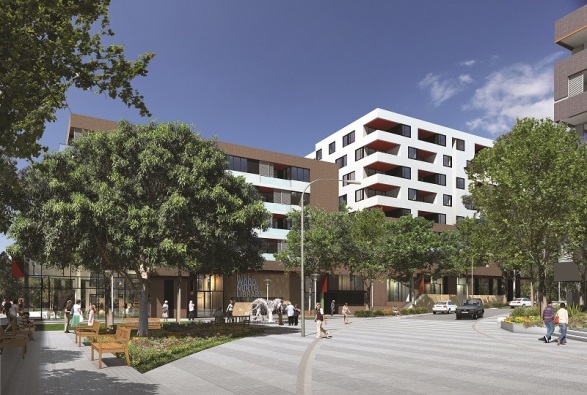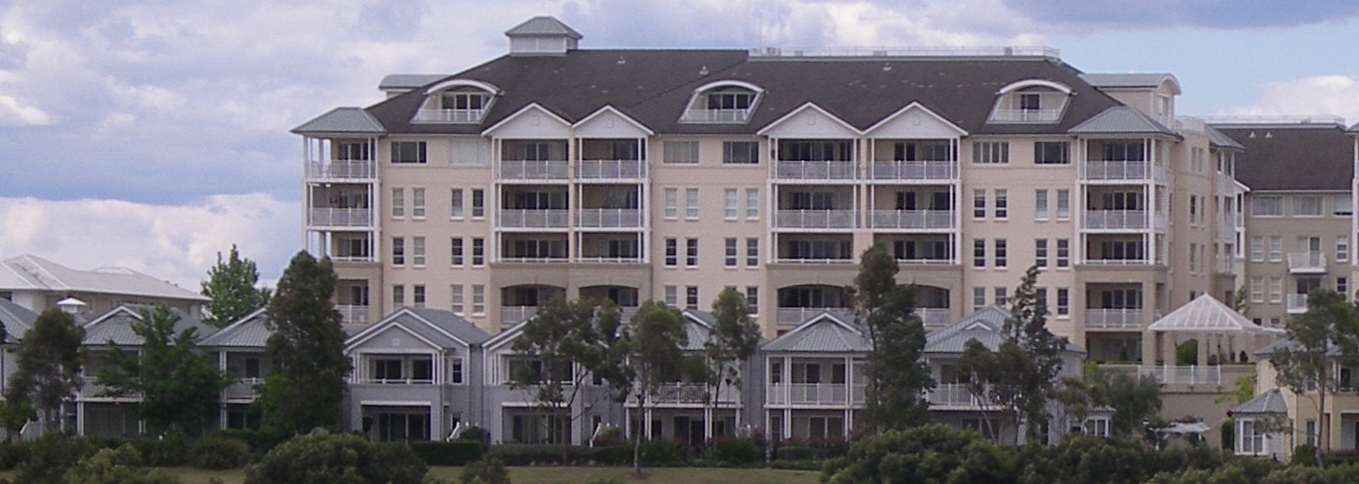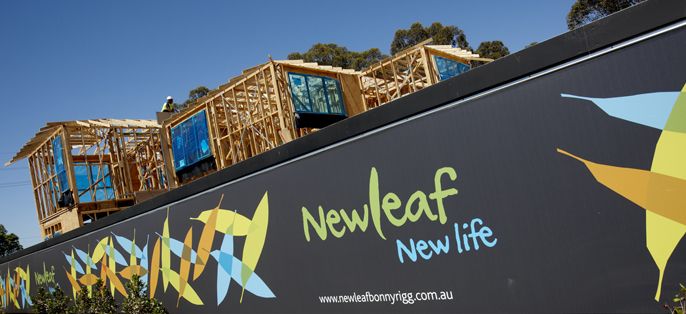
|
7 pm on 25 September sees UNSW hosting what promises to be an outstanding lecture by world-renowned American urban affairs expert, Professor George Galster. Drawing on his masterly work ‘Driving Detroit: the Quest for Respect in the Motor City’, Professor Galster’s presentation will provide an accessible, insightful and at times lurid portrayal of his home city’s catastrophic fall from grace over recent decades. As a study in the unmitigated consequences of housing market failure and dysfunctional urban planning this story is hard to beat. |
|
Informing the electoral policy pitch |
|
Estate renewal evaluation commissioned in Sydney |
|
 City Futures has been appointed to undertake a formative evaluation of the Riverwood North renewal project in SW Sydney. The scheme, a joint venture between Payce Communities, the NSW State Government and St George Community Housing, involves replacing some 180 obsolete public housing units with over 650 new dwellings – the majority for private sale. Numerous social inclusion initiatives are also being rolled out as part of the program, due for completion after 2016. City Futures has been appointed to undertake a formative evaluation of the Riverwood North renewal project in SW Sydney. The scheme, a joint venture between Payce Communities, the NSW State Government and St George Community Housing, involves replacing some 180 obsolete public housing units with over 650 new dwellings – the majority for private sale. Numerous social inclusion initiatives are also being rolled out as part of the program, due for completion after 2016.
|
|
Waterloo Green evaluation published |
Housing NSW has published a summary of the Waterloo Green Neighbourhood Project evaluation completed by City Futures in 2012. Undertaken by Hal Pawson and Crystal Legacy, and focusing on the impacts of enhanced block security and more intensive housing management, the study found that the Project had significantly improved residents quality of life. |
 Thanks to Australian Research Council linkage grant success, a City Futures team will be building on our growing body of work on high density living. In ‘Renewing the Compact City: Economically feasible and socially sustainable approaches to urban redevelopment in a multi-stakeholder environment’ Bill Randolph, Hazel Easthope and Simon Pinnegar will be working with co-sponsors, Urban Growth, NSW Fair Trading, Strata Community Australia (NSW), the Owners Corporation Network of Australia, and Macquarie Bank. Thanks to Australian Research Council linkage grant success, a City Futures team will be building on our growing body of work on high density living. In ‘Renewing the Compact City: Economically feasible and socially sustainable approaches to urban redevelopment in a multi-stakeholder environment’ Bill Randolph, Hazel Easthope and Simon Pinnegar will be working with co-sponsors, Urban Growth, NSW Fair Trading, Strata Community Australia (NSW), the Owners Corporation Network of Australia, and Macquarie Bank.
This two-year project will investigate a key challenge facing city planners in Australia over the next 30 years: how to renew older areas of multi-unit housing, providing not only economically but also socially viable solutions within a market context and enable all players – developers, policymakers and residents – to benefit from the coming city redevelopment.
|
|
Investigating accessibility issues in strata living |
|
National Housing Conference 2013 – Program released |
 City Futures will be well-represented among speakers at this year’s National Housing Conference, being staged in Adelaide from 30 Oct-1 Nov. CF contributions will include Hal Pawson on Public housing transfers – the practice, Bruce Judd on Downsizing, and Gethin Davison on Community resistance to affordable housing. Meanwhile, Vivienne Milligan will open the major concurrent session on Private sector but social good financing: the options for housing. City Futures will be well-represented among speakers at this year’s National Housing Conference, being staged in Adelaide from 30 Oct-1 Nov. CF contributions will include Hal Pawson on Public housing transfers – the practice, Bruce Judd on Downsizing, and Gethin Davison on Community resistance to affordable housing. Meanwhile, Vivienne Milligan will open the major concurrent session on Private sector but social good financing: the options for housing.
Attracting attendance from policymakers, professionals and academics, the biennial NHC is the largest event on affordable housing in the Australasian region. Key themes featuring in this year’s program include contemporary thinking in social good financing, client-centred service delivery, DisabilityCare and the demand for housing, urban place-making and Indigenous housing. Register now.
|
While congratulating the NSW State Government on its proposed inclusion of health as an official ‘planning system’ objective, the City Futures Healthy Built Environments Program (HBEP) has called for articulation  of more specific ways such objectives can be practically implemented. Underpinning these observations, contained in recent HBEP consultation submissions, is a broader question about the system’s prioritisation of economic growth over health and wellbeing. The full submissions – on the NSW planning system and the Draft Metropolitan Plan for Sydney – can be downloaded from the HBEP website. of more specific ways such objectives can be practically implemented. Underpinning these observations, contained in recent HBEP consultation submissions, is a broader question about the system’s prioritisation of economic growth over health and wellbeing. The full submissions – on the NSW planning system and the Draft Metropolitan Plan for Sydney – can be downloaded from the HBEP website.
|
|
How are healthy built environments promoted in NSW? |
 Just published by the CF Healthy Built Environments Program (HBEP) is a report ‘mapping’ projects to promote healthy built environments (HBEs) across NSW. Based on responses from 46 organisations active in the field, the report demonstrates a need for ongoing collaboration between health and built environment professions. As noted by report author Dr Jennifer Kent (pictured), the latter are currently under-represented in HBE activities. The report further illustrates the way HBE activities are ‘governed’, providing a clear mandate for more concrete prioritisation of HBEs in both policy and funding models. Just published by the CF Healthy Built Environments Program (HBEP) is a report ‘mapping’ projects to promote healthy built environments (HBEs) across NSW. Based on responses from 46 organisations active in the field, the report demonstrates a need for ongoing collaboration between health and built environment professions. As noted by report author Dr Jennifer Kent (pictured), the latter are currently under-represented in HBE activities. The report further illustrates the way HBE activities are ‘governed’, providing a clear mandate for more concrete prioritisation of HBEs in both policy and funding models.
|
|
Bonnyrigg Phase 1 Study Completed |

Simon Pinnegar & Edgar Liu completed the first wave of the Bonnyrigg longitudinal panel study in 2012 and its accompanying report for Newleaf Communities in early 2013. Including nearly 100 Bonnyrigg residents (past or present) and renewal program stakeholders, the study was crucially reliant on help from other Faculty staff and students who recruited participants and conducted all 55 non-English interviews. This input was greatly appreciated by the research team and we look forward to involving more colleagues and students in second wave interviewing in 2014.
With assistance from the newly formed Community Kitchen, the team will be hosting a thank you lunch to all the participants in Bonnyrigg in October. The first wave report will be published by Newleaf Communities shortly. |
|
Forthcoming BE/City Futures Seminars and Utzon Lectures |
|
Prof Donald McNeill (UWS) - 'Sydney’s Chinatown: Seven Issues for Urban Designers'
Aug 22, 10.30am.UNSW-Red Centre West Wing. Room 4034 |
 |
Prof Alan Peters (BE) - 'Does too much urban planning result in higher housing prices or slower economic growth - a broader view'
Sept 4, 7pm.UNSW-Chemical Sciences M17 Lecture Theatre |
 |
Dr Jennifer Kent (City Futures) - 'Secured by automobility: why does the private car continue to dominate transport practices?'
Sept 11, 12pm.UNSW-Red Centre West Wing. Room 4035 |
 |
Prof Susan Fainstein (Harvard Graduate School of Design, USA) - 'Justice in the Neo-liberal City'
Sept 16, 7pm.UNSW-Chemical Sciences M17 Lecture Theatre |
 |
Dr Hoon Han (BE) - 'Methodological Challenges in Longitudinal Data Analysis for HILDA'
Sept 25, 12pm. UNSW-Red Centre West Wing. Room 4035 |
 |
Prof George Galster (Wayne State University, USA) - 'Driving Detroit: The quest for Respect in the Motor City'
Sept 25, 7pm.UNSW-Chemical Sciences M17 Lecture Theatre |
 |
|
SOAC 2013 and Inaugural PhD Research Symposium |
Don’t forget the two-yearly State of Australian Cities (SOAC) conference being held at the Shangri La hotel, Sydney 26-29 November 2013. Ten years on from its inauguration, the SOAC series is now established as the leading event on Australian urban research, at which the practitioner and academic research communities meet to exchange ideas and to network. In the process, the conference has grown from an initial attendance of around 200 to reach 350 at Melbourne in 2011.
This year sees the inaugural SOAC PhD Symposium, jointly organised and hosted by UNSW City Futures and UTS, and being held at UTS for two and a half days prior the main SOAC conference. It will involve 63 doctoral students and 16 academic mentors (senior professors and early career researchers) from across New Zealand and Australia, collaborating in small groups where each student presents her/his work in depth, and gets mentor and peer feedback.

|
|
City Futures Publications: Books,
Refereed Journal Articles, AHURI Reports and other Q2 2013 |
Davison, G. (2013). Place-making or place-claiming? Creating a ‘Latino Quarter’ in Oakland, California. URBAN DESIGN International, 18, 200–216. |
Easthope, H., Hudson, S., & Randolph, B. (2013). Urban Renewal and Strata Scheme Termination: Balancing communal management and individual property rights. Environment and Planning A, 45, 1421-1435. |
Herath, S., & Maier, G. (2013). Local particularities or distance gradient: What matters most in the case of the Viennese apartment market? Journal of European Real Estate Research, 6(2), 163-185. |
Kent, J. L., Capon, A., & Thompson, S. (2013). Designing Health Promotion in Practice: An Australasian Perspective. In K. Copeland (Ed.), Australian Healthcare Design (pp. 26-31). Brisbane: International Academy for Design and Health. |
Pawson, H., Legacy, C., & Groenhart, L. (2012). Waterloo Green Neighbourhood Project: Mid-term evaluation Housing NSW. Sydney, Australia |
Taeihagh, A., Givoni, M., & Bañares-Alcántara, R. (2013). Which policy first? A network-centric approach for the analysis and ranking of policy measures. Environment and Planning B: Planning and Design, 40, 595-616. |
| Thompson, S., & Capon, A. (2013). Healthy Built Environments - Getting the Balance Right: 21st century planning for human wellbeing. New Planner, 26. |
| Thompson, S., & Capon, A. (2013). Healthy Built Environments: The Value of Planning for Interdisciplinary Understandings New Planner (pp. 26). |
For a full list of CF publications see the City Futures website
|
You have received this newsletter because you have previously communicated an interest in City
Futures news. We are currently in the process of updating our mailing list, so if you have recently asked us not to send you any newsletters, please accept our apologies.
Any suggestions or feedback you may have on our newsletter would be greatly appreciated, so please feel free to contact us at cityfutures.contact@unsw.edu.au
 Follow us on Twitter! Follow us on Twitter!
|



